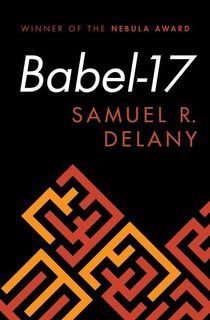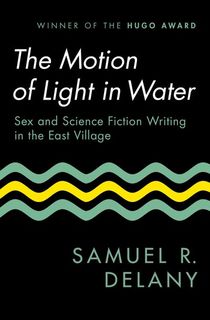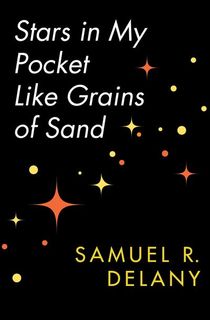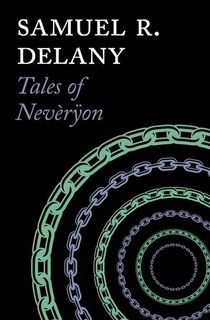Samuel R. Delany is a literary pioneer who broke down the heteronormative default of the science fiction world, and is one of the most influential LGBTQ+ sci-fi authors ever.
Delany beautifully weaves real-life themes into his sci-fi and fantasy, as well as his candid memoirs. He's been recognized with numerous Nebula, Hugo, and Lamba awards, and in 2013 received the prestigious title of Grand Master from the Science Fiction Writers of America.
April 1st marks the author's birthday. To celebrate, we're highlighting these compelling Samuel R. Delany quotes!
“The problem isn't to learn to love humanity, but to learn to love those members of it who happen to be at hand.” —Dhalgren
This quote is from Delany's groundbreaking novel Dhalgren, one of the best-selling science fiction books of all time. Dhalgren challenged readers' expectations for the genre, and for narrative itself.
The controversial book follows a nomadic character called "the Kid" through his time in the labyrinthine, protean city of Bellona, a midwestern metropolis cut off from the rest of the country by a mysterious disaster. The book features frank depictions of queer sex, and is told in a stream-of-consciousness style that has been called everything from "the very best to come out of the science fiction field " (Theodore Sturgeon) to "the worst trash" (Philip K. Dick).
"Endings to be useful must be inconclusive." — The Einstein Intersection
This quote from Delany's Nebula Award-winning novel The Einstein Intersection, published when he was just 25, encapsulates the intentional ambiguity found in some of his greatest works of fiction.

Samuel Delany in New York in 2016.
Photo Credit: Houari B./Flickr (CC)"How we treat our invalids—our mad, our physically or mentally compromised family members—does tell you something about who we are politically, historically, culturally." —The Paris Review interview
In a 2011 interview with The Paris Review, Delany made this comment while reflecting on how chronic illness and disabilities are depicted in fiction, and perceived in real life.
“Historically it's a very new, not to mention vulgar, idea that the spectator's experience should be identical to, or even have anything to do with, the artist's. That idea comes from an over-industrialized society which has learned to distrust magic.” —Dhalgren

Actor Avery Brooks (L.) and Samuel R. Delany (R.) at a tribute to Delany's friend and former student Octavia Butler.
Photo Credit: Houari B./Flickr (CC)"Sometimes you want to say things, and you're missing an idea to make them with, and missing a word to make the idea with. In the beginning was the word. That's how somebody tried to explain it once. Until something is named, it doesn't exist." —Babel-17
Delany's first Nebula Award-winning book, Babel-17, explores the power of language to change our perceptions and actions.
Inspired in large part by the Sapir-Whorf hypothesis—the belief that language impacts its speakers' cognition— Babel-17 is set during an intergalactic war in which one side develops a language that can be weaponized.
The Babel-17 language has no equivalent for the word "I," and dramatically alters the behavior and worldview of those who speak it.
RELATED: 8 Books About Alien Contact and Messages from Outer Space
"Science fiction isn’t just thinking about the world out there. It’s also thinking about how that world might be—a particularly important exercise for those who are oppressed, because if they’re going to change the world we live in, they—and all of us—have to be able to think about a world that works differently." — The Paris Review interview

Samuel Delany was inducted June, 2016, into the New York State Writers Hall of Fame along with Maya Angelou, Stephen Sondheim, Roger Angell, Roz Chast, Jean Craighead George, Grace Paley, and Don Marquis. Pictured here with editor Betsy Mitchell.
Photo Credit: Betsy Mitchell"I was a young black man, light-skinned enough so that four out of five people who met me, of whatever race, assumed I was white ... I was a homosexual who now knew he could function heterosexually. And I was a young writer whose early attempts had already gotten him a handful of prizes ... So, I thought, you are neither black nor white. You are neither male nor female. And you are that most ambiguous of citizens, the writer." —The Motion of Light in Water
Delany's Hugo Award-winning autobiographical work The Motion of Light in Water: Sex and Science Fiction Writing in the East Village chronicles his young adulthood as a gay Black man married to a white woman and living in New York.
The Motion of Light in Water was the second of Delany's memoirs. His other autobiographical writings include Heavenly Breakfast; Times Square Red, Times Square Blue; Selected Letters; and the graphic novel Bread and Wine: An Erotic Tale of New York.
“I’ve often said that, if gay people didn’t exist, straight people would have had to invent them.” -Public Books interview with John Plotz

Sexuality is a major influence on Delany's writing. He is often candid about sex, and aims to reduce societal taboos around pleasure and physical intimacy.
In this interview, he touches on prejudice he has seen within the sci-fi world, despite the fact that many readers were eager for his “stories that clearly had gay underthemes.”
RELATED: Twisting Tropes Through Queer Sci-Fi
"I'm a gay man who came through the AIDs epidemic. The notion that being genteel about intimacy ... That kills people. That kills people. And I just did not want to be complicit in murder." —Strand Bookstore discussion
During a 2013 question and answer panel with artist Mia Wolff for their graphic novel Bread and Wine: An Erotic Tale of New York, Delany shared why honestly depicting sexuality is such a vital aspect of his work.
The autobiographical graphic novel depicts how Delany and his partner Dennis met and became lovers.
RELATED: How Gay Is Your Geek TV?
“You meet a new person, you go with him and suddenly you get a whole new city...you go down new streets, you see houses you never saw before, pass places you didn't even know were there. Everything changes.” -Dhalgren

“Good writing is clear. Talented writing is energetic. Good writing avoids errors. Talented writing makes things happen in the reader's mind — vividly, forcefully...” - About Writing: Seven Essays, Four Letters & Five Interviews
Delany has always been a proponent of teaching others the ways of literature.
His book About Writing dives into his tips and tricks for going from a good to exceptional. He focuses on creative writing and how it has changed, from classics to contemporary times.
RELATED: Afrofuturism Books That Explore the Past, Present, and Future
"Desire isn’t appeased by its object, only irritated into something more than desire that can join with the stars to inform the chaotic heavens with sense." — Stars in My Pocket Like Grains of Sand
Delany's 1984 novel Stars in My Pocket Like Grains of Sand shows his belief that science fiction is as much about reflecting the social attitudes of the present as it is about predicting the future.
The book is set in a far-distant future where humans have colonized space, and are desperately working to find a cure for a recurring planetary extinction event called the Cultural Fugue.
As a defense against the Fugue, human societies adopt two contrasting belief systems: the Sygn, which values diversity and social progress, and the Family, which views the traditional nuclear family bond as sacred.
RELATED: Black Science Fiction and Fantasy Authors You Need to Read
“Praise the sun's warmth on the water in summer and the cold frost on the stones in winter and the difference between them, and you will praise the act [of creation], for the act may only be praised through difference.” - Tales of Nevèrÿon

Throughout Delany’s four-volume Return to Nevèrÿon series, he uses a sword-and-sorcery setting to explore themes relevant to our real world.
This quote in particular contemplates the basic existence of diversity within our society, and encourages readers to celebrate it rather than fear it.
RELATED: Afrofuturism, Africanfuturism, and Writing Black Futures
“We all live our lives from the inside of our bodies out, not from the outside in. Which is why fiction has the texture that it does.” -The Atheist in the Attic
The Atheist in the Attic is a thrilling historical narrative recreating the meeting between mathematician Leibniz and the philosopher Spinoza.
“One writes a story to find out what happens in it. Before it is written it sits in the mind like a piece of overheard gossip or a bit of intriguing tattle. The story process is like taking up such a piece of gossip, hunting down the people actually involved, questioning them, finding out what really occurred, and visiting pertinent locations. -The Jewel-Hinged Jaw: Notes on the Language of Science Fiction
This essay collection celebrates the intricacy of sci-fi writing and argues for its complexity as its own language, rather than just stories of aliens and gadgets.
He breaks down the work of other acclaimed sci-fi authors, and dives into the genre’s unique language.
RELATED: The Best Books on Writing by Sci-Fi and Fantasy Writers
“The only important elements in any society are the artistic and the criminal, because they alone, by questioning the society’s values, can force it to change.” -Empire Star
In the science-fiction novella Empire Star, Comet Jo encounters a crashed spaceship. When one of the spaceship’s travelers gives Comet Jo a message to deliver to Empire Star, he sets out on a journey narrated by another character named Jewel.
Empire Star explores the relationship between social issues and those who look to make real change. Often, the right thing is not the easiest or the most mainstream. Only those willing to risk the comforts of conformity may have the power to make change.
“What's more, I was free to do anything that did not hurt others that strengthened me and helped me in the one thing that we are all put on this earth to do: help one another — because it is the only thing that, in the long run, gives us pleasure, as receiving love and friendship and affection is the only thing that gives us joy and ameliorates the dread of our inevitable extinction.” -Through the Valley of the Nest of Spiders
The 2012 novel Through the Valley of the Nest of Spiders follows the compelling gay, working-class, interracial relationship between Eric Jeffers and Morgan Haskell.
After meeting in a failing tourist town on the coast, the two men spend the next few decades learning how to navigate a relationship in a rapidly-changing world.
This post is sponsored by Open Road Media. Thank you for supporting our partners, who make it possible for The Portalist to celebrate the sci-fi and fantasy stories you love.
Featured photo via Strand Bookstore on YouTube; All others via Houari B. / Flickr (CC)











